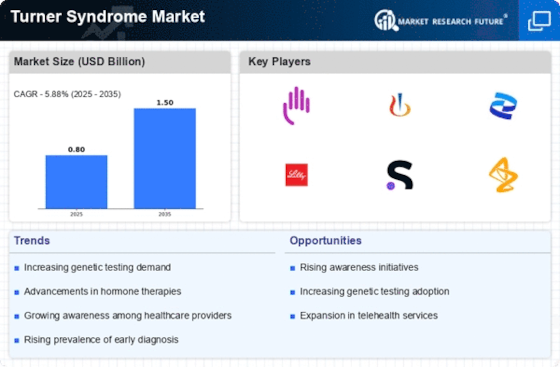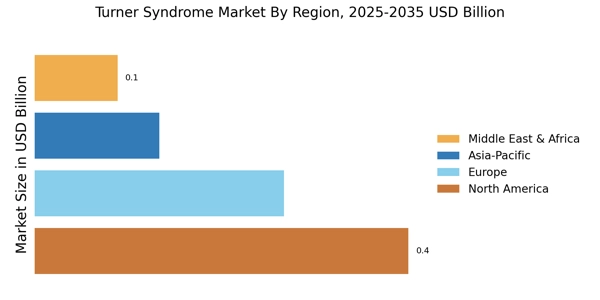Integration of Genetic Testing
The integration of genetic testing into clinical practice is emerging as a key driver in the Turner Syndrome Market. Genetic testing allows for early diagnosis and personalized treatment plans, which are essential for managing the complexities associated with Turner Syndrome Market. As healthcare providers increasingly adopt genetic testing protocols, the market is expected to expand, driven by the demand for accurate and timely diagnoses. This trend is further supported by advancements in technology that have made genetic testing more accessible and affordable. The potential for early intervention through genetic insights may lead to better health outcomes, thereby reinforcing the importance of genetic testing in the Turner Syndrome Market.
Innovations in Treatment Options
Innovations in treatment options are transforming the Turner Syndrome Market. Recent advancements in hormone replacement therapy and growth hormone treatments have shown promising results in improving the quality of life for affected individuals. These innovations not only enhance physical development but also address psychological aspects, which are crucial for overall well-being. The market is witnessing a surge in research and development activities aimed at creating more effective therapies tailored to the unique needs of Turner Syndrome Market patients. As new treatment modalities emerge, healthcare providers are likely to adopt these advancements, thereby driving market growth. The potential for personalized medicine in this context may further revolutionize the Turner Syndrome Market, offering hope for improved patient outcomes.
Increased Focus on Patient Advocacy
The increased focus on patient advocacy plays a pivotal role in shaping the Turner Syndrome Market. Advocacy groups are actively working to raise awareness about Turner Syndrome Market, which has led to enhanced public understanding and support for affected individuals. This heightened awareness is crucial for early diagnosis and intervention, which can significantly impact patient outcomes. Furthermore, advocacy efforts are pushing for more research funding and better healthcare policies, which could lead to improved access to treatments and care. As these organizations continue to mobilize resources and support, the Turner Syndrome Market is likely to benefit from increased investment in research and development, ultimately enhancing the quality of life for patients.
Rising Incidence of Turner Syndrome
The increasing incidence of Turner Syndrome Market is a notable driver in the Turner Syndrome Market. Recent estimates suggest that Turner Syndrome Market affects approximately 1 in 2,500 live female births. This rising prevalence necessitates enhanced healthcare services and treatment options, thereby expanding the market. As awareness grows regarding the condition, more individuals are diagnosed, leading to a greater demand for specialized care and therapies. The Turner Syndrome Market is likely to experience growth as healthcare providers focus on early diagnosis and intervention, which can significantly improve patient outcomes. Furthermore, the need for ongoing management of associated health issues, such as cardiovascular and endocrine complications, underscores the importance of comprehensive care in this market.
Growing Demand for Multidisciplinary Care
The growing demand for multidisciplinary care is significantly influencing the Turner Syndrome Market. Patients with Turner Syndrome Market often face a range of health challenges that require a coordinated approach involving various specialists, including endocrinologists, cardiologists, and psychologists. This trend towards comprehensive care is driven by the recognition that a holistic approach can lead to better health outcomes. As healthcare systems evolve to meet this demand, the Turner Syndrome Market is likely to see an increase in collaborative care models that enhance patient management. The emphasis on multidisciplinary care not only improves the quality of treatment but also fosters a supportive environment for patients and their families, which is essential for long-term health.

















